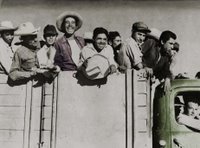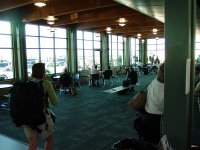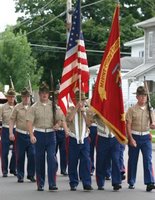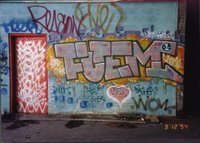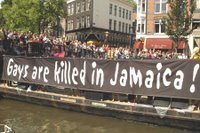
My sister who lived in Ghana for several years, sent this one on to me.
------------------------------------------------------------------------------------------------
Author unknown.
" Some 24 months ago, I finally managed to move back to Ghana with my family and have successfully re-entered the local system. After doing 25 years in the Wild Wild West, this was a life's ambition come true. I have since managed to launch a long-planned business idea and also occasionally undertake financial consultancy on the side.
My little article shares some observations I have made during my time back in Ghana for the sole benefit of those who may wish to follow the rocky road home. Those who have ears to hear let them hear the words I speak.
As a backward, developing country, there is so much that needs to be done that anyone with true discipline and a flexible and analytical approach to problem solving should do well. There is phenomenal money to be made, especially in the service sector where simply being able to provide reliable professional service sets you well ahead of the competition.
Brothers and sisters, believe that Ghana is where the action is. With a bit of capital and a realistic approach to business, you can pick gold bars off the streets of Accra. If you do not believe me, come to Golden Tulip at 6pm and ask yourself what all those Caucasian, Indian, and Chinese hustlers - those who sit downstairs at the bar scheming and smoking ^ what are they doing in Accra. The answer is simple ^ unlike us, they can see the doughnut and not the hole!
Now the reality check. I have to bow my head and say that the majority of Ghanaians are afflicted by a poisonous cocktail of envy, cynicism, laziness, and self imposed barriers to success. The sheer envy that flows through our veins makes a Ghanaian feel happier to see a Lebanese or Indian make a buck than for his own countryman make that same buck. You ignore this fact at your own peril. Spintex Road and the Industrial Area in Accra are full of testimonies and monuments to all those illiterate foreigners who arrived in Ghana penniless and are now dollar millionaires.
Nothing pleases a Ghanaian worker more than to have a white boss. The more abusive the boss, the better, and the more endearing the staff are to them. Go to Melcom, a virtual slave shop and all the girls will be seen literally dancing and singing as they work for their Indian and Lebanese bosses. These foreigners have leveraged our warm embrace (aka Ghanaian hospitality and this deadly trait called envy to enrich ourselves while our own leaders have shut down Ghanaian businesses.
Your poor cousin or even housemaid envies you because they believe you are rich. You may decide to hand over half your wealth to them and that will make them hate you even more! They would rather they gave you that bounty or better still that you were both down in the pits. Instead of a Ghanaian finding out from a successful man the path to prosperity so that he too can become a millionaire, they would rather scheme and plan to pull the person down or discredit his wealth. This is a trait some leading politicians have exploited mercilessly and to great effect.
The cynicism is an even more worrying trait. Most Ghanaians can only see half empty glasses all around them. Show them an opportunity and regardless of what is available, they are blinded by that one missing ingredient, that 1% not available yet, which makes them convinced that the deal will fail.
The bankers do this very well, but journalists and the society at large are not too far behind them. There is a new professional called Social Commentator ^ school drop outs - who sit on FM stations pontificating on every topic under the sun. These people have never set up a kiosk and certainly have no finance training but will analyse a three-way cross border merger between the Government and foreign entities with the conviction of a Goldman Sach investment banker.
If the Government announced that every citizen would get $1mm, the Social Commentator would immediately point out that there will not be enough money machine counters at the banks for a smooth collection of the funds, armed robbery will rise, the country will descend into civil war and therefore the policy is a bad idea.
The Ghanaian is best motivated by personal interest and works best when they have a stake in the business. As such the entrepreneur is a worthy counterpart in any transaction. If the person will get paid directly, you know the business will be done. Even then some sole proprietors run their own business as if they were civil servants managing a Government department.
While the Ghanaian entrepreneur remains a ray of hope, the Ghanaian worker has a dangerous brand of laziness which could easily collapse the average business. Most see no connection between their role in the enterprise and how their salary is paid. As such they will turn up late, skip work at the slightest sign of ill-health, sit on the office phone running up a bill, and do precious little regardless of how well or how poorly they get paid.
Mention an assignment and the Ghanaian does not think of how it should be done to achieve the best or most efficient outcome but rather how much 'juice' they can make on the side. They will therefore complete the job, take their juice, and deliver a shoddy project to you - offering a blank sheepish facial _expression when you ask them the most basic question relating to the project.
And another thing, never count on your Ghanaian employee to give you feedback or suggestions on how to create value or enhance the business. They would rather watch the business collapse, and then complain about unemployment. If you ever get an employee that offers good feedback and constructive input, you must double the person's salary!
When unemployment / retrenchment is announced, SIL members often wail and throw their arms up to the heavens in despair at the doomsday event. However if you had had the opportunity to see these same employees at post, reading their bibles during office hours, chatting with groundnut sellers under a tree and simply shooting the breeze while the company collapsed, you would be less sympathetic.
Worse still, they will never do the little things like turn off a dripping tap, flick the light switch, use the more economical service provider, even when they know their employer is struggling and that they will be unemployed should the business collapse.
This means that all those who dream of building empires quickly realize how
difficult such a vision is to implement. It is nigh on impossible to delegate because the next person is likely to disregard your orders and do their own thing, even if it will collapse your business and wreck their career.
Indecision is another plague in the system. There is an attitude of 'last minute' which starts at Secondary school and travels through university which ends up in the board rooms of our dear nation. Ghanaman will never take a decision until the gun is to their head, then they rush to make a stupid decision. if they know they have to sign a contract, they will dilly dally until the evening before the deadline, then in mad state of panic, you will see the MD with sweaty palms followed by his semi illiterate and
reticent sidekicks scampering around for some lawyer to advice them. You can bet your bottom dollar they will end up swallowing all the penalty clauses in the book because they failed to make an early decision on an unavoidable event! This is the most irritating aspect of life in Ghana. People delaying something that cannot be delayed!
Self imposed barrier to success is something the new age churches have managed to inculcate in the system of the present generation. They tell people that you are not responsible for your success or failures in life. If you are rich, God made you rich and if you are poor, then it is Satan himself drilling holes in your pocket. Nothing happens on its own, it is certainly a curse from ten generations ago when your family members buried something in the family house etc etc.
This is real and people, educated, sensible people believe it and live by such ideologies. This means that most people leave the house at 5am, stay at work from 9 to 5 (note, I did not say work from 9 to 5), attend prayer sessions in the evenings, on Saturdays and Sundays. When they have to review their lives, develop business ideas, or make big plans for the future remains a mystery to me but I am sure after 5 years in the country I may find out.
Remember this - more than money, foreign aid, IMF/world bank, politicians, clinics, roads, democracy or gold, what Ghana needs is human capital. Motherland needs an army of 2,000 sensible, well educated, trained minds, with global exposure and willing to challenge the accepted norms and conventional wisdom, take on Government, family and church and stand their ground to make this land a better place.
Obviously the returnees wanted back home would need to be disciplined themselves. The kind that unfortunately tend to show up at Kotoka are too often are the Kofi Wayo kind, who think because they have been in the US for a few years then everyone here in Ghana is a fool. This overlooks the fact that such a person did precious little back in the US, besides watching cable TV and paying alimony.
We need good people out here so please come home and help fight the war. If you don't the Lebanese, Chinese, and Indians will take our birthplace! You may turn up 20 years hence to retire and find a Chinese president running Ghana"!
Read more!



